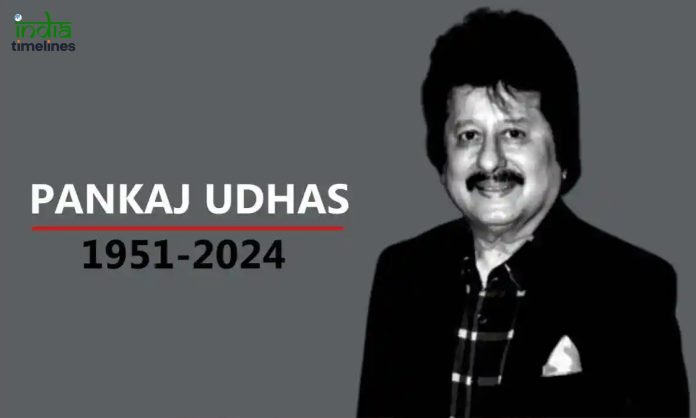
Renowned ghazal singer Pankaj Udhas passed away today at the age of 72. His daughter Nayaab shared the news of his demise on social media. According to ghazal singer Jazim Sharma, speaking to Dainik Bhaskar, Udhas had been battling pancreatic cancer.
Due to difficulty in breathing, he was admitted to Breach Candy Hospital in Mumbai 10 days ago. On Monday morning at 11 o’clock, he took his last breath. Pankaj is survived by his wife Farida and two daughters, Nayaab and Reva. His mortal remains are currently kept at the hospital. Once his brothers and other family members arrive, his body will be taken home. His final rites will be conducted on Tuesday.
Journey of Ghazal Maestro Pankaj Udhas: From Humble Beginnings to Musical Excellence
Pankaj Udhas, the illustrious ghazal singer, was born on May 17, 1951, in Jetpur, Gujarat, into a distinguished family with roots in the zamindari system. His ancestral home was in the town of Charkhaadi near Rajkot. His grandfather was a zamindar, and his family had significant ties to Bhavnagar, where his father, Keshubhai, served as a government employee.
Music ran deep in the Udhas family; while Pankaj’s father played the Israj (a musical instrument), his mother, Jeetuben, had a passion for singing. Influenced by his family’s musical inclination, Pankaj, along with his two brothers, developed an interest in music from a young age.
Despite being born into a family with musical inclinations, Pankaj initially had no aspirations of pursuing a career in singing. However, his life took a turn during the India-China war when Lata Mangeshkar’s patriotic song “Aye Mere Watan Ke Logon” was released. Moved by the song’s emotional resonance, Pankaj performed it, earning him admiration from the audience. In a surprising turn of events, he received a reward of 51 rupees from one of the listeners, marking his first earnings in the music field.
Recognizing Pankaj’s potential after witnessing his outstanding performances at school, his parents decided to enroll him in the Rajkot Music Academy, following in the footsteps of his accomplished brothers, Manhar and Nirmal Udhas, who had already made a name for themselves in the music industry.
Pankaj Udhas’s journey from a modest upbringing in Gujarat to becoming a celebrated ghazal singer exemplifies his dedication, talent, and the pivotal role of his family in nurturing his musical aspirations. His story serves as an inspiration for aspiring musicians, highlighting the transformative power of passion and perseverance in achieving one’s dreams.
Pursuing Dreams Abroad: Pankaj Udhas’ Struggle for Recognition
After several unsuccessful attempts to establish himself in Bollywood, Pankaj Udhas made the bold decision to move abroad. Despite performing on various prestigious stages post his education, he struggled to secure significant roles in the Indian film industry. Even his contribution to the movie “Kaamna” went unnoticed as the film failed to make an impact. It was then that Udhas opted to relocate overseas, seeking better opportunities for his talent. A pivotal moment in his journey occurred during a dinner with Raj Kapoor, where his rendition of “Chitthi Aayi Hai” moved Kapoor to tears, solidifying Udhas’ reputation as a gifted ghazal singer.
Love Against All Odds: Pankaj Udhas’ Journey to Matrimony
In the face of societal barriers, Pankaj Udhas embarked on a journey of love that defied conventions. Despite initial opposition from Farida’s family due to religious differences, Pankaj persisted in pursuing their relationship. Farida’s father, a retired police officer, initially resisted the idea of their union. However, Pankaj’s sincerity and determination won him over, ultimately leading to the acceptance of their love and approval for their marriage. This union not only defied social norms but also showcased Pankaj’s resilience and conviction in following his heart.
Do you know how Pankaj Udaas Started his Work?
Primarily renowned for his renditions of non-film ghazals and geets, Pankaj Udhas surprised Bollywood with his 1987 blockbuster hit, “Chitthi Aayee Hai” from the movie “Naam,” featuring lyrics by Anand Bakshi and music by Laxmikant-Pyarelal. This emotionally resonant song topped the charts, captivating both NRIs and PIOs, evoking a mix of applause and tears. Among his notable works, the 1981 album “Muqarrar” stands out, housing soulful tracks like “Tum Na Maano Magar Haqeekat Hai” and “Deewaron Se Milk Kar Rona Achcha Lagta Hai,” penned by poets Qabil Ajmeri and Qaiser-ul-Jafferi, respectively. The album’s success spurred him to release “Paimana” in 1983, featuring ghazals themed around ‘drinking,’ including popular tracks like “Thodi Thodi Piya Karo” and “La Pila De Saakiya.” Despite his primary focus on non-film music, Pankaj’s journey in Bollywood began in 1972 with the song “Tum Kanhi Samney Aa Jao” from the film “Kaamna,” showcasing his versatility across genres. In his live performances, audiences often clamored for these timeless melodies.
Anu Malik shares his thoughts on Pakaj Udhas
In an exclusive conversation with ETimes, Anu Malik shared his thoughts on Udhas, stating, “If you ask any composer or actor, they will tell you that Pankaj ji was a very jovial, lovable, and talented musician. When I first met him, I played the song ‘Kitaben bahut se padi hogi tune’ from ‘Baazigar’ for him, and he remarked, ‘Anu, tumne itne ghazal numa gaane ko itna commercial kaise bana diya?’ (How did you turn such a ghazal-like song into such a commercial hit?) He hugged me and appreciated my work. He was one of those singers who embraced Bollywood without hesitation, despite being known for ghazals. Today, the industry has lost a shining star.”
When Pankaj Udhas spoke about ‘competition’ in Bollywood
Pankaj Udhas, in an interview some years back, recalled that there was a lot of competition in Bollywood with Kishore Kumar and Mohammad Rafi still at their prime and as a newcomer, it would not be easy for him to make headway, and as he had already been singing ghazals, he decided to shift his focus entirely to them, especially learning Urdu for the purpose.


































Everything is very open with a clear clarification of the challenges.
It was definitely informative. Your website is very useful.
Thank you for sharing! http://N1Ssmp.xyz/wiki/profile.php?id=18798